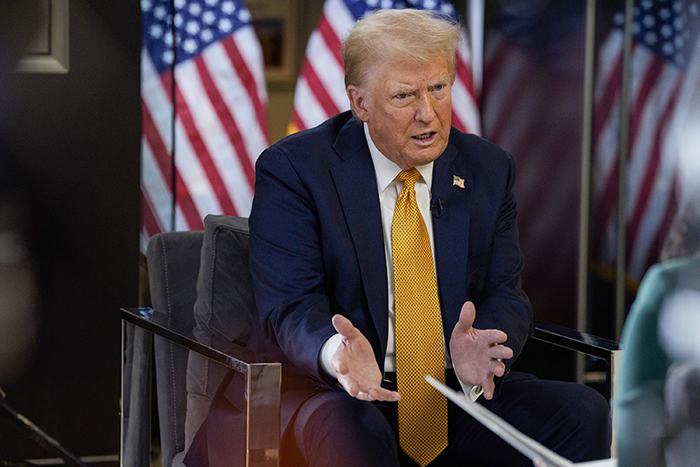New York Correspondences
8 January 2025
Greenland Under Pressure: The Ally Who Dreamed of Becoming a Conqueror

Donald Trump, President-elect of the United States, once again disrupted the global diplomatic landscape on Tuesday by raising the possibility of using force to annex Greenland, an autonomous territory of Denmark. Speaking at a press conference in Mar-a-Lago, he was asked about his intentions regarding the Arctic territory and the Panama Canal. Staying true to his provocative style, he refused to rule out the use of military action, declaring that both regions are “very important for the economic security” of the United States. “I can’t guarantee anything about either one,” he said, sidestepping the diplomatic implications of such a statement. His remarks come after previously describing Greenland as “an absolute necessity for national security” and sending his son, Donald Trump Jr., on a so-called “private” trip to the territory.
This spectacular statement, while chilling, might be laughable for the obvious geopolitical paradox it highlights: NATO’s most powerful military force is threatening another member of the alliance—all under the guise of “economic security.” The irony is as biting as the Arctic winds. Let us not forget that NATO, since its founding in 1949, has rested on a simple promise: to collectively protect its members from external aggression. But what happens when the potential aggressor is a member of this alliance? Trump, in his trademark style of bombastic declarations, seems to ignore this fundamental contradiction, dismissing Danish sovereignty as a minor obstacle on America’s path to greatness.
Greenland, already coveted for its strategic Arctic position and natural resources, has suddenly become a territory that must be annexed at all costs. This stance reflects a deeper discomfort: a redefinition of NATO, not as a collective defense pact, but as a tool for advancing American ambitions. By threatening Danish territory, Trump sends a troubling message: the rules of the game only apply as long as they don’t conflict with U.S. interests. This unilateral vision, far from strengthening the alliance, undermines its foundations, sowing doubt among European members already uneasy about transatlantic tensions.
This isn’t the first time Donald Trump has floated ideas reminiscent of America’s most controversial historical chapters. His threats regarding the Panama Canal—constructed by the United States and handed over to Panama in 1999—betray a barely veiled imperialist nostalgia. Greenland becomes the new “territory to seize,” not in the name of explicit colonial ambitions, but under the banner of “national security.” This posture, appealing to a nationalist segment of his electorate, is woefully outdated in an era of globalization and interdependence. Worse still, it jeopardizes the fragile balances underpinning global diplomacy.
The irony of the situation is too glaring to ignore: the country positioning itself as NATO’s security guarantor becomes a threat to that very security. How can the U.S. justify to Copenhagen or Nuuk that it might force an ally to cede its territory? This contradiction, which could delight a political fiction writer, reveals a bitter truth: American unilateralism, embodied by Trump, makes the multilateral system more vulnerable than ever. As for Greenland, it becomes—much to the dismay of its inhabitants, who feel as if they’ve entered the Twilight Zone—a symbol of one man’s outsized ambitions to redraw the world map according to his whims.
It’s hard not to hope this is all just a joke. Trump, a master of provocations and shocking statements, may once again be toying with the nerves of international diplomacy. But if so, the humor is in poor taste. Threatening an ally’s sovereignty, undermining the foundations of a strategic alliance like NATO, and fueling instability in an already precarious world: this far exceeds the limits of a mere jest. For now, Greenland remains Danish, frozen in place like the icy lands beyond the Wall in Game of Thrones, but for how much longer?
Romuald Sciora is the Director of the Political and Geostrategic Observatory of the United States at IRIS, where he serves as an associate researcher. A Franco-American essayist and political analyst, he has authored numerous books, articles, and documentaries and regularly appears in international media to comment on current affairs. He resides in New York.

